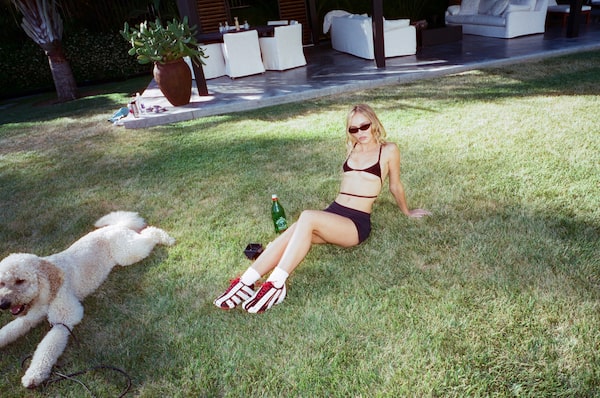
Abel “The Weeknd” Tesfaye, one of The Idol's co-creators, plays Tedros a sleazy nightclub owner on the show.Eddy Chen/HBO / Crave
The Idol
Created by Abel (The Weeknd) Tesfaye, Reza Fahim and Sam Levinson
Starring Lily-Rose Depp, Abel (The Weeknd) Tesfaye and Dan Levy
Premieres June 4 on HBO/Crave, with new episodes added weekly
The Idol, a superficially tantalizing and woefully hollow entertainment industry satire, begins with a single take pushing closer and closer toward Lily-Rose Depp. The actress is giving her most playing Jocelyn, a Britney Spears-like pop star who is recovering from a psychotic break and gearing up to drop her new album.
In this opening moment, Jocelyn is barely dressed, wearing only negligee and the ID bracelet from a psychiatric hospital – contorting her body during a cover shoot into varying poses, as a photographer directs her to feed the camera a performance of unadulterated sex and trauma.
All in one take, Jocelyn’s lusty pout makes way for a stare into the void, as a tear rolls down her cheek. The moment feels like an unholy mash-up of Sarah Gadon’s performance in the feminist axe-murderer drama, Alias Grace – which opens with a comparable single take – and the sex scene in Michelangelo Antonioni’s voyeur thriller, Blow-Up. It’s also a knowing and provocative cold-open from director Sam Levinson.
If you’ve seen Levinson’s film, Assassination Nation, a satiric modern update on The Scarlet Letter, and his HBO series Euphoria, a high-school series steeped in drug and rape culture, you are probably familiar with his particular brand as peddler of gratuitous and voyeuristic sex and trauma – which comes packaged with feminist posturing as cover. There’s a reason why The Idol arrived at the Cannes Film Festival last week with so much built-in wariness, never mind the troubling reports of on-set drama.
The series, premiering on Crave this Sunday, is created by Levinson along with Abel Tesfaye – the Toronto-bred artist formerly known as The Weeknd – and his producing partner Reza Fahim, whose previous life as an L.A. nightclub operator we can only assume provides some inspiration. Levinson replaced original director Amy Seimetz (She Dies Tomorrow), reportedly throwing out most of her material, because, according to sources cited by Deadline, Tesfaye was upset that she leaned too far into the “female perspective.”
That perspective is, indeed, nowhere to be seen in the first two episodes, which screened for critics at Cannes and confirmed everyone’s apprehensions. The series parades Depp’s bare breasts while teasing mental health as a plot point to be exploited.
The pilot episode, which is largely concerned with how the internet will receive a photo of Jocelyn posing after she received a facial (not the cosmetic kind), follows the star and her handlers through the antic album cover shoot day. Depp, daughter to Johnny and Vanessa Paradis, gives a noteworthy performance as a pop star mourning her mother’s recent death. Jocelyn spends the episode trying to protect her sanity as she’s jostled around in her own mansion between photographers, PR reps (Dan Levy), managers (Hank Azaria), and a Vanity Fair reporter observing the chaos (Assassination Nation star Hari Nef).

Lily-Rose Depp as Jocelyn, a pop star staging a comeback after a psychotic break.Eddy Chen/HBO / Crave
Levinson knows how to exploit chaos, maintaining an exhilarating momentum in these scenes and the second episode’s gruelling music video shoot. These are moments that have the energy we saw in Euphoria’s highly meme-able bathroom meltdown featuring Sydney Sweeney. They’re also reminders why his content can be appealing beyond the titillation. Levinson leans on hip-hop, Vogue Magazine and Gaspar Noé aesthetics while turning online debates into snappy back-and-forths.
The Idol’s plot kicks in when Jocelyn takes comfort in Tedros (Tesfaye), a night club owner and music producer giving R. Kelly vibes. He creeps his way into Jocelyn’s world, inspiring her as an artist with a bit of S&M that is largely framed in a way to give pleasure to the voyeur instead of the character.
That, of course, is the recurring issue with the leery sex in Levinson’s work. These scenes often feel less curious about their characters, emotional connections and desires, and more interested in gawking and pushing to see how far Levinson can get with his actors. They’re degrading instead of sexy.
There’s a reason I’m conflating Levinson with his content. He does it, too, making characters his mouthpieces and thwarting any attempt at separating the art from the artist. Remember Netflix’s Malcolm & Marie, where John David Washington plays a director railing against a white woman critic at the Los Angeles Times who challenges his work with arguments based on identity politics? That was a barely disguised snap back at Katie Walsh’s LA Times review of Levinson’s Assassination Nation, which accurately called out the film’s exploitative “sexualized violence” and patronizing takes on female empowerment.
In The Idol’s pilot, during that opening cover shoot, Jane Adams plays a studio executive who seems to respond to Euphoria’s more prudish internet critics with a spiel about letting audiences enjoy sensationalized sex, drugs and mental health concerns. While she’s talking, Jocelyn is in the photo shoot, pushing back against a meddling intimacy coordinator who is trying to enforce an agreed upon nudity rider designed to protect her. Jocelyn exerts her bodily autonomy by having the intimacy coordinator tossed out.
In previous interviews, Euphoria actors Minka Kelly and Sydney Sweeney both recalled having to push back against some of the unnecessary nudity that Levinson would ask of them. So it’s pretty rich for him to open The Idol with a sequence where an intimacy coordinator enforcing boundaries comes off as a nuisance.
It’s also downright queasy how Levinson continues to make content, which purports to be about how women are preyed upon, about himself, where his cast become props who either defend his voyeurism or are subjected to it.
Special to The Globe and Mail